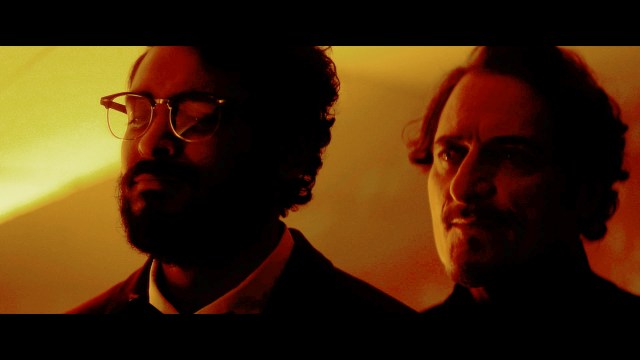Neon Lights Movie Review- A Trippy Psychological Thriller With An Interesting Premise
Neon Lights by writer and star Dana Abraham and writer/director Rouzbeh Heydari is part Psycho, part Identity and I’m not entirely convinced it achieves either. That’s not to say it is a bad movie; it’s just a confusing one. There is a lot to like about the twisty thinker that keeps you guessing long after the credits roll. I enjoy these kinds of slow burns that are heavy on ambiguity. Admittedly, I was drawn to this movie because of the intriguing premise and interesting cast.

Psychological thrillers often suffer under the weight of their big ideas. Twists for the sake of being twisty leave viewers frustrated. If a careful balance isn’t struck between mystery and character development, the viewer can be left feeling cheated. On the other hand, these films resonate with viewers when the protagonists’ ability to engender empathy and fool the watcher is strong. If we don’t care what happens to the lead or know immediately that something is wrong with the story, everything unravels pretty quickly. Neon Lights doesn’t collapse into its own gravity, but it will leave you hanging in uncertain space.
Neurodivergent and clearly unstable, Clay(Dana Abraham) is a tech genius struggling with the pressures of running a huge megacorp. After a disastrous interview aimed at righting the corporate ship, he retreats to his country home. He next invites his estranged brothers, sister-in-law, and niece to his remote home in the hopes of reconnecting. In nonlinear interludes that finally make sense in the closing moments, we watch Clay try to work through severe trauma.
What exactly is the trauma he is dealing with, we don’t know yet. However, it has rendered him nearly incapable of moving on and being successful. Over the next hour and a half, his family becomes victims of a barely seen force that may or may not be there, and we watch as Clay spirals down into a dangerous threat or a vulnerable victim. All of this is spliced together with strange episodes with a therapist who couldn’t possibly be in the house and, even more confusing, a hospital stay with a sadistic nurse. If that isn’t enough, an overbearing father, played menacingly by Kim Coates(Sons of Anarchy), constantly belittles him and prods him into meltdowns.
Most of the characters are unlikable. Violent and immature almost across the board, these selfish, superficial people are hard to care about even when they begin dying. The brothers read like personality traits rather than real people. James Stephen Tracey is a man-child looking for a payday. Oldest brother Benny(René Escobar Jr.) is the picture of male toxicity with a temper and a fist to match. Both actors gamely go through the paces even when the script is not quite up to their talent. This may have been a deliberate choice, though, as it does add to the perplexing quality of the scenes. Clay, our anchor to the story, is a mess of anxiety, insecurity, mania, and simmering emotions. His quiet voice and near-constant nervous laughter are painful to watch.
Abraham does the heavy lifting here as a man on the edge. He is easy to sympathize with as he throws himself into the role with rigid shoulders and stilted steps. His interactions with his family range from achingly tender to hyper-aggressive. A sweet conversation with his niece helps solidify Clay’s inherent sensitivity even when things take a dark turn later in the film. Clay’s interactions with his father showcase great work between Abraham and Kim Coates. Their collaboration carries the film even when it threatens to buckle under the pressure of too many incomplete plot threads and heady notions. Their chemistry is electric and elevates the bizarre sequences making them informative rather than simply weird.
All that we see or seem, is but a dream within a dream.
Edgar Allen Poe
Like the enigmatic Poe, reality can be the vapor left behind after a hazy nightmare that leaves you out of breath and sweaty. Ultimately there is too much going on in Neon Lights to latch onto anything concrete. Who’s real and what happened to Clay’s family could be debated for hours. The surprise ending will likely split audiences. Some will love it, and others will be left cold. It depends on your perspective and tolerance for ambiguity. Rouzbeh Heydari’s film is a gorgeously shot, overly complicated film that shows a ton of promise if only those neon lights had been a tad brighter. In any case, For fans of trippy slashers masquerading as psychological thrillers, this is worth a watch. It is streaming everywhere on VOD right now.

As the Managing Editor for Signal Horizon, I love watching and writing about genre entertainment. I grew up with old-school slashers, but my real passion is television and all things weird and ambiguous. My work can be found here and Travel Weird, where I am the Editor in Chief.
